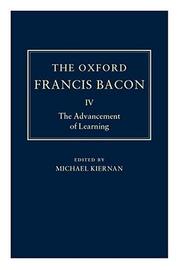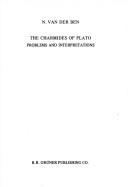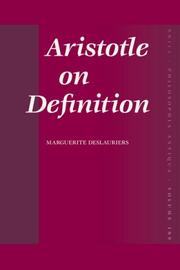| Listing 1 - 4 of 4 |
Sort by
|

ISBN: 0198123485 9780198123484 Year: 2003 Volume: 4 Publisher: Oxford Clarendon
Abstract | Keywords | Export | Availability | Bookmark
 Loading...
Loading...Choose an application
- Reference Manager
- EndNote
- RefWorks (Direct export to RefWorks)
Logic --- Knowledge, Theory of --- Learning --- Science --- Logique --- Théorie de la connaissance --- Apprentissage --- Sciences --- Early works to 1800. --- Philosophy --- Early works to 1800 --- Methodology --- Ouvrages avant 1800 --- Philosophie --- Méthodologie --- -Science --- -Natural science --- Science of science --- Learning process --- Comprehension --- Education --- Epistemology --- Theory of knowledge --- Psychology --- -Philosophy --- -Epistemology --- Natural science --- Théorie de la connaissance --- Méthodologie --- Logic - Early works to 1800. --- Knowledge, Theory of - Early works to 1800. --- Learning - Philosophy - Early works to 1800. --- Science - Methodology - Early works to 1800.

ISBN: 9060322746 9027272549 1283903245 9789060322741 9789027272546 9781283903240 Year: 1985 Publisher: Amsterdam : B. R. Gruner Pub. Co.,
Abstract | Keywords | Export | Availability | Bookmark
 Loading...
Loading...Choose an application
- Reference Manager
- EndNote
- RefWorks (Direct export to RefWorks)
The Charmides is among Plato's most intriguing and perplexing dialogues. The range of subjects touched or treated is extremely wide: matters logical, epistemological, moral, ethical, political, and religious. In many cases, these are discussed in a highly inconclusive and aporetic way, especially when it comes to the subject of knowledge. Finally, the dialogue is also difficult on almost every level of its expression; mock-reasonings, misunderstandings, ironies, paradoxes, and perplexities abound. As a result, the run of its many arguments, both on the short and the long range, and its overall
Ethics --- Knowledge, Theory of --- Early works to 1800 --- Plato --- 875 PLATO --- -Knowledge, Theory of --- -Epistemology --- Theory of knowledge --- Philosophy --- Psychology --- Deontology --- Ethics, Primitive --- Ethology --- Moral philosophy --- Morality --- Morals --- Philosophy, Moral --- Science, Moral --- Values --- 875 PLATO Griekse literatuur--PLATO --- Griekse literatuur--PLATO --- Aflāṭūn --- Aplaton --- Bolatu --- Platon, --- Platonas --- Platone --- Po-la-tʻu --- Pʻŭllatʻo --- Pʻŭllatʻon --- Pʻuratʻon --- Πλάτων --- אפלטון --- פלאטא --- פלאטאן --- פלאטו --- أفلاطون --- 柏拉圖 --- 플라톤 --- Plato. --- Greek literature. --- Balkan literature --- Byzantine literature --- Classical literature --- Classical philology --- Greek philology --- Platon --- Платон --- プラトン --- Criticism and interpretation. --- Ethics - Early works to 1800 --- Knowledge, Theory of - Early works to 1800 --- Plato - Charmides

ISSN: 00791687 ISBN: 9789004156692 9004156690 9786611921118 1281921114 9047420586 9789047420583 9781281921116 6611921117 Year: 2007 Volume: 109 Publisher: Leiden Brill
Abstract | Keywords | Export | Availability | Bookmark
 Loading...
Loading...Choose an application
- Reference Manager
- EndNote
- RefWorks (Direct export to RefWorks)
This book argues that Aristotle offers us a consistent theory of definition, according to which a particular type of definition – one which states the formal cause of a simple item – is fundamental. It begins by considering definitions as indemonstrable first principles in demonstrations, and inquires how such definitions can have the certainty required by that role. Later chapters look to the Metaphysics to understand how the unity of definitions guarantees their certainty, and to the Topics to discover why definitions must be formulated in terms of the genus and differentia(e) of the object defined. This work contributes to our understanding of the connection between the function of definition in demonstration and its character as a statement of essence.
Logic --- Definition (Philosophy) --- Logique --- Définition (Philosophie) --- Early works to 1800. --- Early works to 1800 --- Ouvrages avant 1800 --- Aristotle --- Language and languages --- Knowledge, Theory of --- Science --- Ontology --- Pragmatism --- Philosophy. --- Methodology --- Philosophy --- Aristotle. --- Definition (Philosophy). --- Définition (Philosophie) --- Definability --- Definition (Logic) --- Undefinability --- Semantics (Philosophy) --- Aristoteles --- Aristote --- Aristotile --- Aristoteles. --- Arisṭāṭṭil --- Aristo, --- Aristotel --- Aristotele --- Aristóteles, --- Aristòtil --- Arisṭū --- Arisṭūṭālīs --- Arisutoteresu --- Arystoteles --- Ya-li-shih-to-te --- Ya-li-ssu-to-te --- Yalishiduode --- Yalisiduode --- Ἀριστοτέλης --- Αριστοτέλης --- Аристотел --- ארסטו --- אריםטו --- אריסטו --- אריסטוטלס --- אריסטוטלוס --- אריסטוטליס --- أرسطاطاليس --- أرسططاليس --- أرسطو --- أرسطوطالس --- أرسطوطاليس --- ابن رشد --- اريسطو --- Pseudo Aristotele --- Pseudo-Aristotle --- アリストテレス --- Language and languages - Philosophy. --- Logic - Early works to 1800. --- Knowledge, Theory of - Early works to 1800. --- Definition (Philosophy) - Early works to 1800. --- Science - Methodology - Early works to 1800. --- Science - Philosophy - Early works to 1800. --- Ontology - Early works to 1800. --- Language and languages - Philosophy - Early works to 1800. --- Pragmatism - Early works to 1800.
Book
ISBN: 2718600098 9782718600093 Year: 1973 Publisher: Auvers-sur-Oise : Editions Galilée,
Abstract | Keywords | Export | Availability | Bookmark
 Loading...
Loading...Choose an application
- Reference Manager
- EndNote
- RefWorks (Direct export to RefWorks)
"La métaphysique s'était affadie. C'est l'année même où moururent les derniers grands métaphysiciens français du XVIIe siècle, Malebranche et Arnauld, que naquirent Helvetius et Condillac. [...] A côté de la réfutation négative de la théologie et de la métaphysique, il fallait un système antimétaphysique positif". Marx. L'Essai répond à un tel projet. C'est le premier grand livre de Condillac, la première fondation aussi d'un système qui domina toute la pensée des idéologues. Marx ajoute : "Condillac n'a été supplanté dans les écoles françaises que par la philosophie éclectique". Depuis lors, on peut en effet parler d'une sorte de censure. Sournoise, retorse, symptomatique, elle traverse l'histoire de l'université française, singulièrement de son institution philosophique. La lecture de Condillac par Maine de Biran et Victor Cousin aura forgé une grille pesante. Aujourd'hui encore. Et un programme : ce mot définit aussi ce qui reste de Condillac, en général, dans l'enseignement, les examens, les concours, les thèses. Une des conséquences de cette histoire : il n'était pas facile de mettre la main sur ce livre. Comme si on n'avait pas jugé bon de le laisser entre toutes les mains : à interroger les lois complexes de certaines machines (éditoriales, universitaires, idéologiques, politiques, donc) on peut en admettre l'hypothèse. Est-ce à dire que ce livre est, aujourd'hui, révolutionnaire ? Les choses n'étant pas si simples, il faut donc, d'abord, pouvoir lire. Lire le livre, certes, mais aussi l'enjeu des censures, refoulements, surcharges, oblitérations - le palimpseste et ses grattures. Une longue analyse de Derrida, "L'archéologie du frivole", amorce ce travail.
Psychology --- Knowledge, Theory of --- Language and languages --- Psychologie --- Théorie de la connaissance --- Langage et langues --- Early works to 1850 --- Early works to 1800 --- Philosophy --- Ouvrages avant 1850 --- Ouvrages avant 1800 --- Philosophie --- -Language and languages --- -Psychology --- -#SBIB:321H24 --- #SBIB:1H20 --- Behavioral sciences --- Mental philosophy --- Mind --- Science, Mental --- Human biology --- Soul --- Mental health --- Foreign languages --- Languages --- Anthropology --- Communication --- Ethnology --- Information theory --- Meaning (Psychology) --- Philology --- Linguistics --- Epistemology --- Theory of knowledge --- -Early works to 1800 --- Geschiedenis van de politieke en sociale theorieën: 18e eeuw --- Metafysica en wijsgerige godsleer --- Théorie de la connaissance --- #SBIB:321H24 --- Philosophy&delete& --- Psychology - Early works to 1850 --- Knowledge, Theory of - Early works to 1800 --- Language and languages - Philosophy - Early works to 1800 --- Early works to 1800. --- Psychologie. --- Théorie de la connaissance. --- Langues.
| Listing 1 - 4 of 4 |
Sort by
|

 Search
Search Feedback
Feedback About
About Help
Help News
News